Dr. Moheb Ramzi Stino was the Minister of Tourism and Aviation for Egypt under Anwar Sadat. [1] His brother, Dr. Kamal Stino, was Vice-Prime Minister under Nasser. His other brother, Charles Stino, was the vice Minister of Industry, under Nasser.
Dr. Moheb Ramzi Stino was the Minister of Tourism and Aviation for Egypt under Anwar Sadat. [1] His brother, Dr. Kamal Stino, was Vice-Prime Minister under Nasser. His other brother, Charles Stino, was the vice Minister of Industry, under Nasser.

Muhammad Anwar el-Sadat was an Egyptian politician and military officer who served as the third president of Egypt, from 15 October 1970 until his assassination by fundamentalist army officers on 6 October 1981. Sadat was a senior member of the Free Officers who overthrew King Farouk in the Egyptian Revolution of 1952, and a close confidant of President Gamal Abdel Nasser, under whom he served as Vice President twice and whom he succeeded as president in 1970. In 1978, Sadat and Menachem Begin, Prime Minister of Israel, signed a peace treaty in cooperation with United States President Jimmy Carter, for which they were recognized with the Nobel Peace Prize.
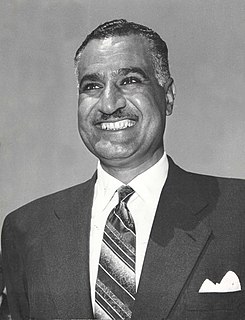
Gamal Abdel Nasser Hussein was an Egyptian politician who served as the second president of Egypt from 1954 until his death in 1970. Nasser led the 1952 overthrow of the monarchy and introduced far-reaching land reforms the following year. Following a 1954 attempt on his life by a Muslim Brotherhood member, he cracked down on the organization, put President Mohamed Naguib under house arrest and assumed executive office. He was formally elected president in June 1956.
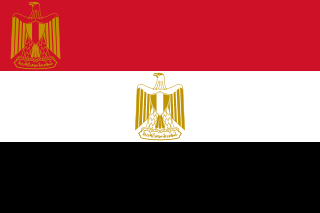
The President of Egypt is the executive head of state of Egypt and the defacto appointer of the official head of government under the Egyptian Constitution of 2014. Under the various iterations of the Constitution of Egypt following the Egyptian Revolution of 1952, the president is also the supreme commander of the Armed Forces, and head of the executive branch of the Egyptian government. The current president is Abdel Fattah el-Sisi, in office since 8 June 2014.
According to most scholars the history of modern Egypt dates from the start of Muhammad Ali's rule in 1805 and his launching of Egypt's modernization project that involved building a new army and suggesting a new map for the country, though the definition of Egypt's modern history has varied in accordance with different definitions of modernity. Some scholars date it as far back as 1516 with the Ottomans' defeat of the Mamlūks in 1516–17.
His Excellency Dr. Kamal Ramzi Stino was born in Mansoura, Egypt. His father, Ramzi Beik Stino Hanna was the first Egyptian irrigation engineer to take over supervision duties for the entire Egyptian irrigation system under the British. At that time, Egypt was under British rule. His mother, Afefa Michael Gad, was the daughter of one of the most prominent Coptic landowners in the country. Kamal was the eldest of his five siblings: Moheb, Charles, George, Georgette and Madeline.

The National Democratic Party was the ruling political party in Egypt from 1978 to 2011. The party was founded by President Anwar El Sadat in 1978.

Mahmoud Fawzi was an Egyptian diplomat and political figure who was Prime Minister of Egypt from 1970 to 1972 and the vice president of Egypt from 1972 to 1974.

Mohamed Abdel Hakim Amer was an Egyptian military officer and politician. Amer served in the 1948 Arab–Israeli War, and played a leading role in the military coup that overthrew King Farouk in 1952. After leading Egyptian forces in the 1956 Suez war, he was appointed Minister for Defense by President Gamal Abdel Nasser and was Egyptian Vice President between 1958 to 1965.
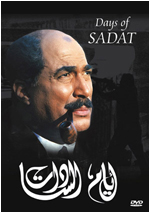
Days of Sadat is a 2001 Egyptian biographical film about President of Egypt Anwar Al Sadat. The movie starred several prominent actors, with Ahmad Zaki as the Egyptian president. It is considered to be one of Zaki's greatest performances, capturing intimate details about the president in great accuracy. One notable characteristic of Sadat was his speech pattern, which Ahmad Zaki captured strongly in his performance.
Dr. Farid Kamal Ramzi Stino is an Egyptian scientist, scholar, and entrepreneur who was born in Cairo, Egypt on September 1, 1943. He is the son of Dr. Kamal Ramzi Stino, the late Deputy Prime Minister of Egypt under Nasser's regime, and Lady Farida Shawky Shenouda, the daughter of Shawkey BEK Shenouda of Egypt. He earned his Bachelor of Science degree from Cairo University, Egypt,in 1964. He then travelled to the United States and earned his Master of Science degree in 1968 and his Ph.D. degree in 1971, from The University of Georgia, in Athens, Georgia, USA. It was there that he met and married his wife of 33 years, Dr. Zandra Hargrove Stino. He has five living children: Ramzi, Farida, Karim, Magdi and Farrah. He is the beloved grandfather of Jadon Stino Gibson, Martino Ramzi Stino, Natalia Stino Gibson, Mario Ramzi Stino, and Austen Karim Stino.

Hussein Mahmoud Hassan el-Shafei, was a member of Egypt's 1952 revolutionary leadership council and served as vice president under two Egyptian presidents, Gamal Abdel Nasser and Anwar Sadat. He was one of the nine men who had constituted themselves as the committee of the Free Officers Movement, led the country's cavalry corps during the uprising and was one of only three living members of the Revolutionary Command Council at the time of his death.
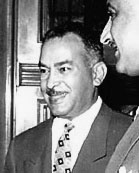
Ali Sabri was an Egyptian politician of Turkish origin.
The History of Republican Egypt spans the period of modern Egyptian history from the Egyptian Revolution of 1952 to the present day, which saw the toppling of the monarchy of Egypt and Sudan, the establishment of a presidential republic, and a period of profound economic, and political change in Egypt, and throughout the Arab world. The abolition of a monarchy and aristocracy viewed widely as sympathetic to Western interests, particularly since the ousting of Khedive Isma'il Pasha, over seven decades earlier, helped strengthen the authentically Egyptian character of the republic in the eyes of its supporters.

Abdel Latif Boghdadi or Abd el-Latif el-Baghdadi was an Egyptian politician, senior air force officer, and judge. An original member of the Free Officers Movement which overthrew the monarchy in Egypt in the 1952 Revolution, Boghdadi later served as Gamal Abdel Nasser's vice president. The French author Jean Lacouture called Boghdadi "a robust manager" who only lacked "stature comparable to Nasser's." The two leaders had a fallout over Nasser's increasingly socialist and pro-USSR policies and Boghdadi subsequently withdrew from political life in 1964, although he mended ties with Nasser before the latter's death in 1970.
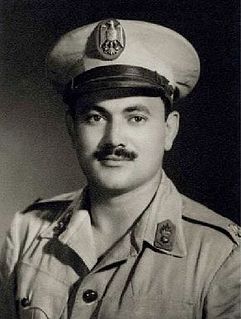
Kamal El-Din Hussein was a member of the Egyptian Free Officers who overthrew King Farouk.
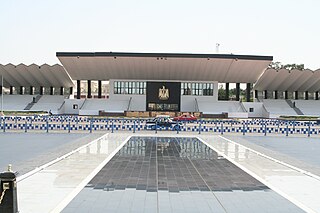
The assassination of Anwar Sadat occurred on 6 October 1981. Anwar Sadat, the President of Egypt, was assassinated during the annual victory parade held in Cairo to celebrate Operation Badr, during which the Egyptian Army had crossed the Suez Canal and taken back a small part of the Sinai Peninsula from Israel at the beginning of the Yom Kippur War. The assassination was undertaken by members of the Egyptian Islamic Jihad.

The history of Egypt under Anwar Sadat covers the eleven year period of Egyptian history from Anwar Sadat's election as President of Egypt on 15 October 1970, following the death of President Gamal Abdel Nasser, to Sadat's assassination by Islamist fundamentalist army officers on 6 October 1981. Though presenting himself as a Nasserist during his predecessor's lifetime, upon becoming President, Sadat broke with many of the core tenets of the domestic and foreign policy ideology that had defined Egyptian politics since the Egyptian Revolution of 1952. In addition to abandoning many of Nasser's economic and political principles via the Infitah policy, Sadat ended Egypt's strategic partnership with the Soviet Union in favour of a new strategic relationship with the United States, initiated the peace process with the State of Israel in exchange for the evacuation of all Israeli military forces and settlers from Egyptian territory, and instituted a form of politics in Egypt that, whilst far removed from Egypt's pre-revolution democratic system, allowed for some multi-party representation in Egyptian politics. Sadat's tenure also witnessed a rise in governmental corruption, and a widening of the gulf between rich and poor, both of which would become hallmarks of the presidency of his successor, Hosni Mubarak.

Egyptian nationalism is based on Egyptians and Egyptian culture. Egyptian nationalism has typically been a civic nationalism that has emphasized the unity of Egyptians regardless of their ethnicity or religion. Egyptian nationalism first manifested itself as Anti-English sentiment during the Egyptian revolution of 1919.
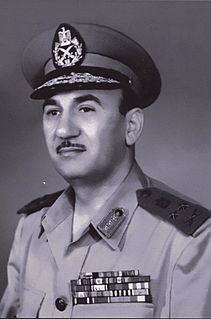
Mohammed Ahmed Sadek was an Egyptian colonel general who served as defense minister under the rule of President Anwar Sadat.

The Corrective Revolution was a reform program launched on 15 May 1971 by President Anwar Sadat. It involved purging Nasserist members of the government and security forces, often considered pro-Soviet and left-wing, and drumming up popular support by presenting the takeover as a continuation of the Egyptian Revolution of 1952, while at the same time radically changing track on issues of foreign policy, economy, and ideology. This includes a large shift in Egyptian diplomacy, building ties to the United States and Israel, while breaking from the USSR and, after signing the Egyptian-Israeli Peace Treaty, Egypt's subsequent suspension from the Arab League.